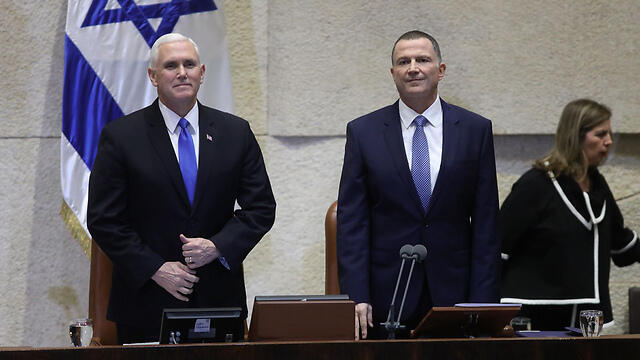Getting your Trinity Audio player ready...
One thing is clear after US Vice President Mike Pence’s speech at the Knesset on Monday: US President Donald Trump is determined to reach the next election after keeping at least one of his promises—to move the American embassy from Tel Aviv to Jerusalem.
The short contradiction between the president and the prime minister’s statements on the move’s timetable cameto an end with the vice president’s promise, which was undoubtedly written in the White House’s West Wing. He says it will happen by the end of 2019. How convenient: Just in time for the beginning of the American election year.
That moment, without a doubt, was the visit’s highlight for the Netanyahu government. It finally became clear that the embassy move wasn’t just an empty promise that would be fulfilled after peace or after the arrival of the Messiah. Trump intends on doing it.
The opposite moment was when Pence reiterated the administration’s commitment to support the establishment of a Palestinian state “if both sides agree.” That’s a clear pro-Israel formula, but Prime Minister Benjamin Netanyahu refrained from applauding his American friend at this stage. The person who legitimized the Palestinian state in his Bar-Ilan speech knows that applauding the two-state solution wouldn’t be appreciated by his “base”—the solid right-wing base—which, in case you haven’t noticed, is running the state.
Pence's Knesset speech (Video: Knesset Spokesperson's Office)
(צילום: דוברות הכנסת)
There is, of course, a connecting line here. Leaders’ conduct should be read, first and foremost, according to their private and political interests. These interests are loaded with diplomatic, ideological and educational arguments; but it all comes down to a survival interest.
Trump’s survival depends on his ability to explicitly tell the public that he’s not just another politician who gets elected and forgets what he promised. That’s the reason Washington is paralyzed right now, because the president keeps insisting on funding for the US-Mexico wall he promised.
Talking about survival, Pence has quite a good chance of becoming US president. Nine of his predecessors had the honor of being promoted after the sitting president was struck by a tragedy. When Lyndon Johnson was appointed vice president, he estimated that he had a 25-percent chance of becoming president (if John F. Kennedy died in office). “I looked it up,” he told an acquaintance. “One out of every four presidents has died in office. I’m a gamblin’ man, darlin’, and this is the only chance I got.” Johnson became president.
Many in the American conservative camp will rejoice if Pence replaces Trump following a resignation or an impeachment. After the president passed the tax reform, he has become a lot less useful for the Republican establishment, and the vice president’s views are much more right-wing than Trump’s.
2 View gallery


Arab MKs disrupt Pence’s speech before being forcefully removed by ushers. A successful moment for the vice president
(צילום: EPA)
In Washington, Pence is seen as holding radical views, but also as an organized and pleasant person. His response to the protest staged by Arab Joint List lawmakers was an example of limiting and preventing the Knesset’s embarrassment by pointing to the democracy demonstrated through the protest. The Balad members’ behavior (Joint List leader Ayman Odeh and other Knesset members left the place without holding up signs) showed great disrespect for the occasion—and that was its purpose. But protesting is the understandable weapon of the weak and of the opposition, and we shouldn’t get too excited about it. Pence definitely didn’t seem bothered by it.
The ushers and security personnel were so stressed out by the protest that they ripped the signs and forcefully pushed the MKs out, while the coalition members were busy applauding Pence enthusiastically. Some of the American journalists were shocked—more by the reaction than by the protest. One of them, Andrea Mitchell, compared the event to "Capitol Police dragging members of the congressional black caucus off the House floor."
It was a very awkward moment for the Knesset on all sides, and a pretty successful moment for the vice president. Up until that moment, his visit to the Middle East had barely been addressed in America. Thanks to the incident, it received wide coverage. Holding up signs during an American vice president’s speech isn’t a dignified protest like walking out of the room, but a quiet protest wouldn’t have made the same headlines in the United States. Pence’s team can send MK Jamal Zahalka a bouquet of flowers.
Nadav Eyal is Channel 10's chief international correspondent.





